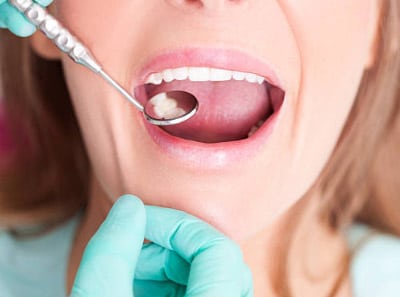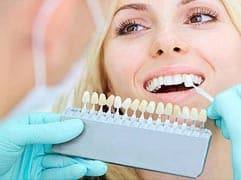Information on Oral Cavity Diseases
Dentistry Built on Relationships, Honesty, and Trust
Des Moines Iowa's Solution for Diseases of the Oral Cavity
Almost every disease and disorder that affects the oral cavity (the mouth) has a genetic component.
Even the most common oral diseases - tooth decay and gum disease - have genetic influences.
Both tooth decay (dental caries) and gum disease (periodontal disease) show various clinical symptoms and seriousness among individuals who otherwise practice similar oral hygiene habits. One reason why symptoms are so variable is that people inherit different degrees of genetic susceptibility or resistance to germs (bacteria) found in the mouth. Other diseases and disorders that can directly or indirectly affect oral tissues include metabolic diseases (such as diabetes), cancers of the head and neck, and developmental defects (like cleft lip and cleft palate).
Let Iowa Dental Group show you why we're one of the most sought-after providers of dental care in the region. Contact us today by either using the provided contact form or calling us at (515) 277-6358.

What are Oral Diseases?
Oral care doesn't just keep your teeth strong; it can have a significant effect on your general wellness, too. Nearly one in 10 people have some sign of poor dental health, and in some instances, that number increases to almost 100 percent.
The most common oral diseases are:
- Dental Cavities
- Gum Disease
- Infectious Diseases
- Injury Trauma
- Oral Cancers
Tooth Decay
Tooth decay, known formally as dental caries, has been a serious health problem for all nations since time immemorial. For centuries, tooth decay was thought to be the handiwork of an elusive and, in some cultures, evil tooth worm that gnawed holes into the white, highly mineralized enamel and left all those in its wake in pain. But superstition has yielded to science and its explanation that certain oral bacteria discharge mineral-eroding acid onto the enamel, starting the gradual process of decay. Over the last several decades, dental researchers have made tremendous progress in defining and learning to thwart the decay process. This work has involved the three-pronged strategy of discovery, innovation, and prevention - and produced one of the major public health success stories of the 20th century.
Periodontal Disease
Gingivitis
Gingivitis is the mildest and most common form of periodontitis. It is caused by the toxins in plaque and leads to periodontal disease. People at increased risk of developing gingivitis include pregnant women, women taking birth control pills, people with uncontrolled diabetes, steroid users and individuals who control seizures and blood pressure using medication.
Periodontal Disease
Chronic periodontal disease is the most common form of the disease and occurs much more frequently in people over 45. Chronic periodontal disease is characterized by inflammation below the gum line and the progressive destruction of the gingival and bone tissue. It may appear that the teeth are gradually growing in length, but in actuality, the gums are slowly recessing.
Oral Cancer
Oral cancer includes cancers of the mouth and the pharynx (the back of the throat). Oral cancer accounts for roughly two percent of all cancers diagnosed annually in the United States. Approximately 35,000 people will be diagnosed with oral cancer each year, and about 7,600 will die from the disease. On average, 60 percent of those with the disease will survive more than five years. Oral cancer most often occurs in people over the age of 40 and affects more than twice as many men as women.
Possible Signs & Symptoms
See a dentist or physician if any of the following symptoms last for more than two weeks.
- A sore, irritation, lump or thick patch in your mouth, lip, or throat
- A white or red patch in your mouth
- A feeling that something is caught in your throat
- Difficulty chewing or swallowing
- Difficulty moving your jaw or tongue
- Numbness in your tongue or other areas of your mouth
- Swelling of your jaw that causes dentures to fit poorly or become uncomfortable
- Pain in one ear without hearing loss
TMJ Disorders
Among the most common, irritating and difficult to diagnose problems with head and neck pain are temporal mandibular joint problems, more commonly known as TMJ problems. The joint is located near the ear where the top of the mandible or lower jaw meets the upper jaw at the base of the skull.
Like all other joints in the body, the TMJ is subject to inflammation and other chronic joint problems. Many of these issues may be caused by destructive bite habits like clenching or grinding. These actions create pressure on the joint that can lead to inflammation and the general breakdown of the joint itself.
What makes TMJ problems difficult to diagnose and treat is the fact that the symptoms vary widely in both location and severity. Symptoms can range from a slight clicking in the jaw with no pain to severe head and neck pain which is not relieved by medication.
Once diagnosed correctly treatments include everything from simple placement of a nightguard, which prevents pressure on the joint to surgical intervention in more severe cases. A dental health professional is a person most able to diagnose this widely variable and widespread issue.
Malocclusion
Occlusion refers to the alignment of teeth and the way that the upper and lower teeth fit together (bite). Ideally, all upper teeth fit slightly over the lower teeth. The points of the molars fit the grooves of the opposite molar.
The upper teeth keep the cheeks and lips from being bitten, and the lower teeth protect the tongue.
Malocclusion is most often hereditary, which means the condition is passed down through families. There may be a difference between the size of the upper and lower jaws or between jaw and tooth size, resulting in overcrowding of teeth or abnormal bite patterns.
Symptoms
- Abnormal alignment of teeth
- Abnormal appearance of the face
- Difficulty or discomfort when biting or chewing
- Speech difficulties (rare) including lisp
- Mouth breathing (breathing through the mouth without closing the lips)
Iowa Dental Group
You place a lot of trust in your dentist, and we will always be honest with you. This philosophy of educating our patients has been the hallmark of why we have been successful for over 30 years.
Our Promise
We have always prided ourselves in offering the highest quality dentistry at a fair and reasonable fee. One that the patient is willing to pay with gratitude and we are willing to accept with gratitude. Our patients are satisfied when treatment is completed or we will continue to strive to meet our own high expectations.
Actual Patient Reviews
We have so many terrific reviews it's impossible for us to list them all! Thanks for supporting Iowa Dental Group with your gratitude.
Dental Office Location
Iowa Dental Group prides ourselves in offering the highest quality dentistry at a fair and reasonable fee.
Des Moines, Ia 50311
(515) 277-6358
iowadentalgroup@hotmail.com
https://www.iowadentalgroup.com
Iowa Dental Group Contact Form
Our Des Moines' Dentists Bob Margeas DDS & Nicholas Economos are eager to help provide any answers you may have. Contact us today regarding optimal oral health.
Dentist Office Hours
Our Dentists look forward to answering any dentistry related questions or dental concerns you may have regarding your overall oral health and smile.
Office Hours
| Monday: | 7:30am - 5:00pm |
| Tuesday: | 7:30am - 5:00pm |
| Wednesday: | 7:30am - 5:00pm |
| Thursday: | 7:30am - 5:00pm |
| Friday: | Closed |
| Saturday: | Closed |
| Sunday: | Closed |
















